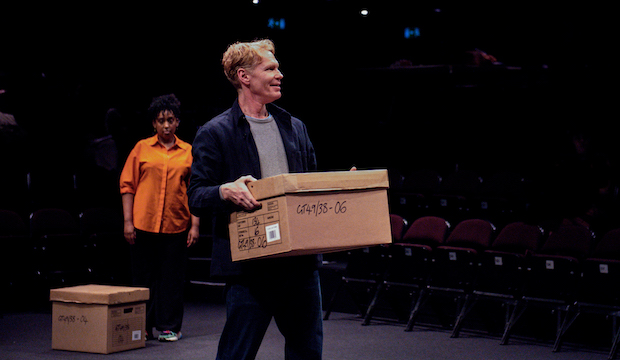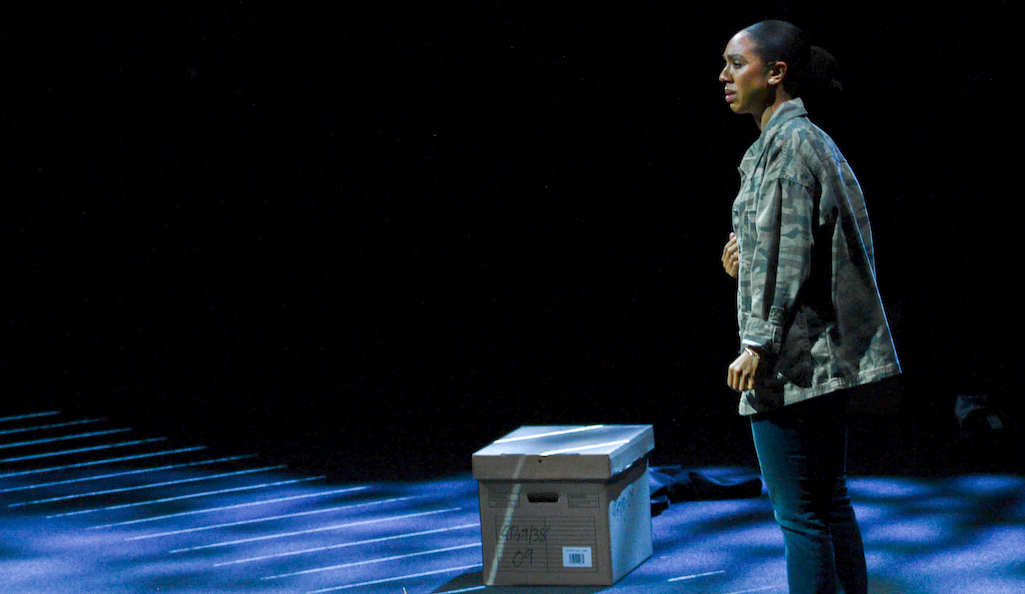Grenfell: in the words of survivors, National Theatre review ★★★★★
Gillian Slovo’s verbatim play recounting the experiences of survivors of the Grenfell Tower fire is thorough, absorbing and sensitively handled at the National Theatre
Grenfell: in the words of survivors at National Theatre. Photo: Sophie Wedgwood
There will be no images of fire, we’re told, as the cast of Gillian Slovo’s new play introduce themselves and the survivor of the Grenfell Tower disaster, which left 72 people dead in June 2017, who they’ll be playing. The subtext of this message? We’re not here to watch trauma porn. Co-directors Phyllida Lloyd and Anthony Simpson-Pike have also gone to lengths to make this production inclusive and accessible: we can leave at any time, even if this means crossing the stage of the National’s Dorfman Theatre, which has been arranged in-the-round for the production. The actors will make way for viewers if they need to take a breather.
The play itself comprises verbatim interviews with 11 survivors, spliced with key moments from the inquest that followed. It’s thorough, absorbing and appropriately infuriating, but most importantly, it returns a voice to the victims of a tragedy who have been all but forgotten as those accountable have pointed fingers and shifted blame.

Michael Shaeffer and Nahel Tzegai in Grenfell: in the words of survivors at National Theatre. Photo: Myah Jeffers
In a play which earns its three-hour run time, the first hour is dedicated to the backstory of the tower and those who lived there – a common theme among whom was, ironically, the sense of prosperity and safety they felt upon being assigned their Grenfell home. But by the time the Tories came to power in 2010, the block was considered a nuisance: these warm recollections of residents are juxtaposed with behind-the-scenes plans to tear down the eyesore block upsetting the aesthetic appeal of Kensington and Chelsea, and via screens overseen by video designer Akhilda Krishnan, we also hear David Cameron rattle off plans to scrap various regulations, which would later result in flammable cladding being added to the building during a refurbishment done on the cheap.
In one poignant early scene, Doctor Who’s Pearl Mackie, playing survivor Natasha Elcock, makes the point that she was proud of where she lived, and that it wasn’t until the media coverage following the fire that she realised residents of Grenfell were regarded as poor. Others – especially those from ethnic minority backgrounds – tell us they were already wise to their status as ‘second-class citizens’, noticing the slapdash and impractical fixes carried out inside the homes they were told to be grateful for as beneficiaries of social housing.

Pearl Mackie in Grenfell: in the words of survivors at National Theatre. Photo: Myah Jeffers
The testimonies of the survivors, which make up the majority of the second act, are delicately handled by the cast. Standing spotlit by Azusa Ono’s impactful lighting, which is also effective at depicting the tower’s smoke-clogged stairwells using thin beams of shadowy light on an otherwise darkened stage, each recounts their personal experience of that night.
Woven between these harrowing accounts are scenes of shocking revelations from the inquest regarding the abuse of health and safety regulations, for which the cast step away from their primary characters to play a carousel of officials from the government, the fire service, and the companies that made and supplied building materials. These scenes are recorded live and projected onto screens around the theatre, with the names of the interviewees helpfully flashing up so we know who's on the dock.
There are no stars in this show. It’s very much an ensemble piece handled sensitively by a cast who barely take a bow. A short third act sees its theatre façade fall entirely, as the play ends with footage of the real survivors making a plea to help continue their fight for justice six years on. We’re then led outside the theatre to a makeshift memorial – a reminder that the story of Grenfell is real and ongoing, not ready to be confined within a theatre’s walls.
If the play’s final call to arms sounds preachy, so what? In a story that’s at risk of being swept under the rug by officials in denial, it’s important to hear some truth wrapped up in a reminder not to forget.
The play itself comprises verbatim interviews with 11 survivors, spliced with key moments from the inquest that followed. It’s thorough, absorbing and appropriately infuriating, but most importantly, it returns a voice to the victims of a tragedy who have been all but forgotten as those accountable have pointed fingers and shifted blame.

Michael Shaeffer and Nahel Tzegai in Grenfell: in the words of survivors at National Theatre. Photo: Myah Jeffers
In a play which earns its three-hour run time, the first hour is dedicated to the backstory of the tower and those who lived there – a common theme among whom was, ironically, the sense of prosperity and safety they felt upon being assigned their Grenfell home. But by the time the Tories came to power in 2010, the block was considered a nuisance: these warm recollections of residents are juxtaposed with behind-the-scenes plans to tear down the eyesore block upsetting the aesthetic appeal of Kensington and Chelsea, and via screens overseen by video designer Akhilda Krishnan, we also hear David Cameron rattle off plans to scrap various regulations, which would later result in flammable cladding being added to the building during a refurbishment done on the cheap.
In one poignant early scene, Doctor Who’s Pearl Mackie, playing survivor Natasha Elcock, makes the point that she was proud of where she lived, and that it wasn’t until the media coverage following the fire that she realised residents of Grenfell were regarded as poor. Others – especially those from ethnic minority backgrounds – tell us they were already wise to their status as ‘second-class citizens’, noticing the slapdash and impractical fixes carried out inside the homes they were told to be grateful for as beneficiaries of social housing.

Pearl Mackie in Grenfell: in the words of survivors at National Theatre. Photo: Myah Jeffers
The testimonies of the survivors, which make up the majority of the second act, are delicately handled by the cast. Standing spotlit by Azusa Ono’s impactful lighting, which is also effective at depicting the tower’s smoke-clogged stairwells using thin beams of shadowy light on an otherwise darkened stage, each recounts their personal experience of that night.
Woven between these harrowing accounts are scenes of shocking revelations from the inquest regarding the abuse of health and safety regulations, for which the cast step away from their primary characters to play a carousel of officials from the government, the fire service, and the companies that made and supplied building materials. These scenes are recorded live and projected onto screens around the theatre, with the names of the interviewees helpfully flashing up so we know who's on the dock.
There are no stars in this show. It’s very much an ensemble piece handled sensitively by a cast who barely take a bow. A short third act sees its theatre façade fall entirely, as the play ends with footage of the real survivors making a plea to help continue their fight for justice six years on. We’re then led outside the theatre to a makeshift memorial – a reminder that the story of Grenfell is real and ongoing, not ready to be confined within a theatre’s walls.
If the play’s final call to arms sounds preachy, so what? In a story that’s at risk of being swept under the rug by officials in denial, it’s important to hear some truth wrapped up in a reminder not to forget.
TRY CULTURE WHISPER
Receive free tickets & insider tips to unlock the best of London — direct to your inbox
| What | Grenfell: in the words of survivors, National Theatre review |
| Where | National Theatre, South Bank, London, SE1 9PX | MAP |
| Nearest tube | Waterloo (underground) |
| When |
13 Jul 23 – 26 Aug 23, 7:00 PM – 10:00 PM |
| Price | £10 - £65 |
| Website | Click here for more information and to book |